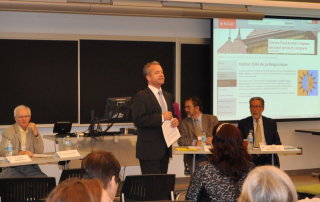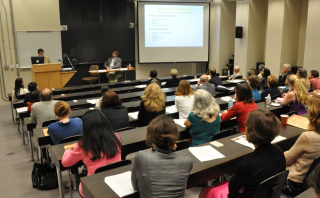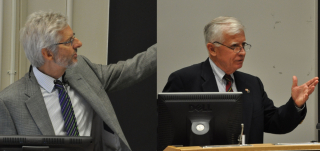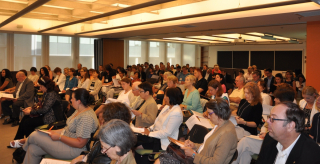
The seventh edition of the Summer Institute of Jurilinguistics was held on 30 August 2013 at the Faculty of Law of McGill University. It was organized by the Paul-André Crépeau Centre for Private and Comparative law, in collaboration with the other members of the Network of Jurilinguistic Centres. The Institute brought together more than 120 participants drawn from different fields with ties to Jurilinguistics.
The theme of this year’s Institute was "Word Games: Translating. Writing. Thinking Law" and it was an ideal forum to ponder from multiple perspectives the importance of properly translating, writing and thinking law, the means to do so, as well as the difficulties inherent to such an undertaking.
The scholarly programme for the day was shared amongst two plenary sessions and four thematic workshops. Participants were able to select two of the four workshops.

At the conclusion of the morning plenary, participants proceeded to a series of workshops that focused on how law is written, with reference to definitions in Codes and legislation.
The two morning workshops explored how to write definitions in the legal context, in particular with respect to legislative drafting. The first, led by Richard Tremblay, Professor of Legislative Drafting at Université Laval, and moderated by Professor Patrick Forget from the Département des sciences juridiques of the Faculté de science politique et de droit of UQAM, was entitled Pour une approche plus fonctionnelle en matière de rédaction législative [ppt]. The second workshop, discussing the interpretation and the drafting of bilingual laws in Canada, was led by Karine McLaren, translator and jurist at the CTTJ, and moderated by Jean Frédéric Ménard [streaming audio].

In the afternoon, the workshops focused on words in law and how we understand them, touching on common law in French and the role that language plays in a legal tradition. The first of these, entitled La dimension culturelle du langage juridique: un défi pour le traducteur et le comparatiste [ppt], was led by Alexandre Guigue, researcher at Transius and Professor at Université de Genève and Université de Savoie, and moderated by Me Laurence Bich-Carrière [streaming audio]. The second workshop of the afternoon block, featuring Professor Alain Levasseur from Louisiana State University and moderated by Professor Gaële Gidrol-Mistral of the Département des sciences juridiques of the Faculté de science politique et de droit of UQAM, was titled Langues et langage du droit des contrats [streaming audio].

The closing plenary, titled “Communication et accessibilité du droit”, shed light on the various aspects and impacts of the specialization of legal language in terms of access to justice, particularly in linguistic minority settings [streaming audio]. As Dean Cornu stated, “la langue du législateur est (et surtout devrait-être) sobre, dépouillée, sans emphase, enflure ni fioritures, seulement attentive à dire le nécessaire, simplement ordonnée à son utilité sociale” (Gérard Cornu, Linguistique juridique).
Chaired by Gérard Snow, the plenary included three panellists. First, Andréa Suurland, president of Linguistic Rights McGill, offered her reflections on the accessibility of legal sources in English and French for both legal traditions within Canada. Ms. Suurland’s contribution was entitled Réflexions sur la disponibilité des sources juridiques en français dans les provinces de common law, et en anglais dans la province du Québec : corrélation avec l’accès à la justice. Second, Stéphanie Roy, plain language specialist at Éducaloi, discussed the importance of plain language in legal communication. Finally, Joseph-Yvon Thériault, Professor of Sociology at UQAM, gave a presentation on sociology and linguistic rights in Canada.

The seventh Summer Institute was a striking success, a reminder that these institutes remain exemplary as scholarly encounters concerning jurilinguistics. The organizers, the administrative officers of each of the centres which form the Network of Jurilinguistics Centres, and the participants, all expressed their enthusiastic reaction to this meeting.
Programme [pdf]
This day was made possible due to the support of Justice Canada. The Crépeau Centre also extends its thanks to the Dean’s Office.
The Institute was accredited for 5.25 hours of continuing legal education by the Barreau du Québec.
